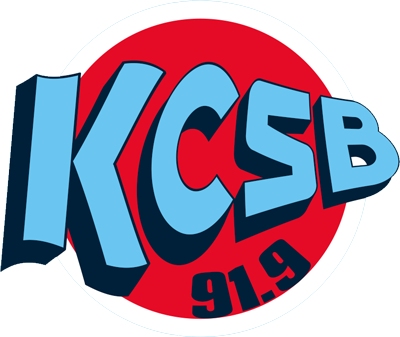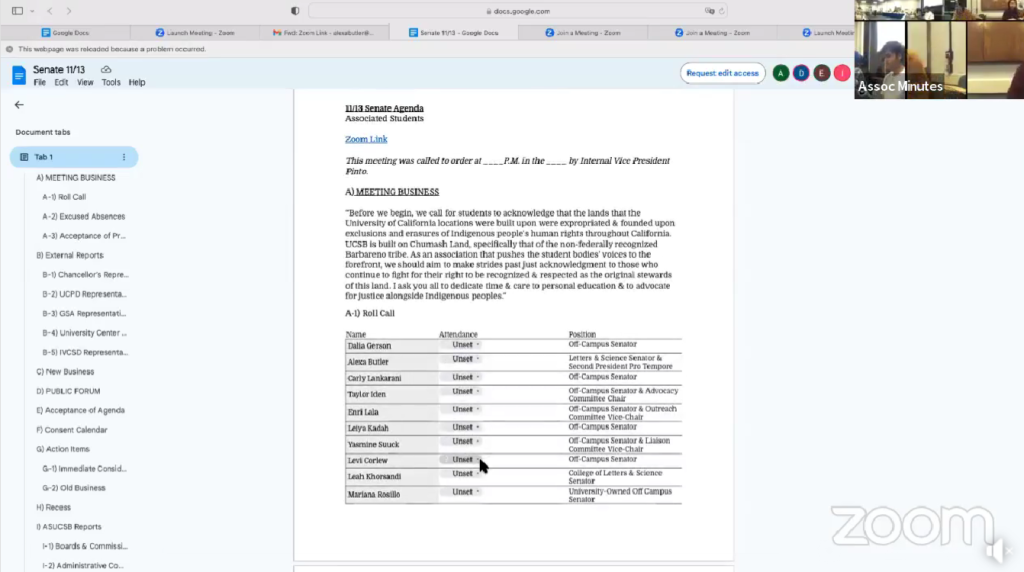AS Senate Recap – 11/13/24
This recap first appeared in the November 18th edition of the KCSB News Weekly Newsletter.
The AS Senate is a group of elected student representatives which serves as the policy-making body of Associated Students. Every Wednesday at 6:30 PM, the AS Senate convenes to pass bills and resolutions, hear reports from Boards, Committees, and Units (BCUs), and hold public forum.
KCSB’s Joyce Chi breaks down what happened at their meeting on November 13, 2024.
- The search for UCSB’s new chancellor continues. Senator and First President Pro Tempore Dan Siddiqui is on the Search Advisory Committee (SAC) to find a new chancellor. As the only undergraduate student voice on the committee, he told the Senate that “the cards are stacked against us in terms of who gets a voice in these rooms and who is allowed to be heard.” He said his priorities for the new chancellor would include campus climate, housing, and financial aid.
-
- The SAC’s membership includes the UC President, UC regents, and professors from UCSB and other UCs, as well as one representative each for UCSB trustees, alumni, staff, graduate students, and undergraduate students.
- The undergraduate + graduate student town hall for the chancellor search will take place on Wed. 11/20 from 4:30 to 5:30 PM on Zoom. You can register here.
- Other town halls for faculty, staff, and alumni will also take place on 11/20. See more information here.
-
- There will be a special election held later in the school year for the Student Advocate General position, as the current SAG Alvin Wang said he would be graduating in Winter Quarter.
- The Senate began implementing recorded votes for funding and legislation. For example, Senators have to raise their hands to vote “yes,” “no,” or “abstain.” This makes it clearer the number of Senators voting to affirm, reject, or abstain from a motion.
-
-
- Before the new policy, it worked like this: the Internal Vice President would ask all Senators at once if anybody had “objections to the consent” to a given motion. Those in agreement with the motion would simultaneously respond “consent.” If there were no objections voiced, the motion would pass.
-
-
-
-
-
- The recorded vote method was proposed with the hopes of engaging Senators and pushing them to think more critically before voting.
- This is in line with the Senate’s new standing rules (see Section C).
-
-
-
~~~
- The Senate passed the following bills and resolutions:
-
-
-
- This new numbering system was recommended by the Compliance Office in order to standardize the naming and tracking of new legislation.
-
-
-
-
-
- Reforms like meal swipe rollover, donation, and sharing were spearheaded by the Student Advocate General, the AS President, and the UCSB chapter of the Young Democratic Socialists of America. Listen to our explanation of this year’s meal swipe reforms.
-
-
-
- The following two resolutions were drafted at the suggestion of Attorney General Eric Carlson. During the 11/6 Senate meeting, Carlson spoke as a student to suggest the Senate reaffirm the campus’ support for students who may feel vulnerable after the results of the presidential election.
-
-
-
- The original bill already passed last month. This new bill establishes the Accountability Director position (each Senate President Pro Tempore would have two Accountability Directors, for a total of four). They’ll be tasked with making sure Senators are fulfilling responsibilities like attending Senate meetings, holding office hours, working on new legislation, etc.
-
-
-
-
-
- This bill increases the number of software developers on the SAG’s Technology Committee from three to five.
-
-
-
-
-
- This bill clarifies language relating to how much extra honoraria will be given out as part of this award, which was established in A Bill to Reform Honoraria in ASUCSB V3.
-
-
-
-
-
- This resolution creates a temporary pilot program “to evaluate the impact of targeted DEI funding.” It would use $15,000 from the Senate Unallocated fund to support “events that promote diversity, equity, and inclusion.”
-
-
-
-
-
- Besides the recorded vote policy, one major change has to do with what happens if Senators violate “the rules of decorum for Senate meetings.” If these rules are violated during the meeting, like if “non-AS-related activities” are done in an obvious way without taking a point of personal privilege, Senators may be issued a strike by whoever is presiding over the meeting (the “presiding officer”).
- The first two strikes will be considered warnings; the third will exclude them “from the discussion of the specific agenda item;” and any following strikes could result in less honoraria.
- That last point of reducing honoraria faced pushback from Senators, while others said the focus should be on encouraging participation among all Senators. Senate Leadership has complained that they’ve had to spend much time wrangling Senators.
- The first two strikes will be considered warnings; the third will exclude them “from the discussion of the specific agenda item;” and any following strikes could result in less honoraria.
- Other rules of decorum include referring to other Senators, public forum speakers, etc. with their title and last name; focusing discussion on the current agenda item; and having recognition from the presiding officer before speaking.
- Besides the recorded vote policy, one major change has to do with what happens if Senators violate “the rules of decorum for Senate meetings.” If these rules are violated during the meeting, like if “non-AS-related activities” are done in an obvious way without taking a point of personal privilege, Senators may be issued a strike by whoever is presiding over the meeting (the “presiding officer”).
-
-
- The Senate tabled the following bills and resolutions:
-
-
-
- Raíces de mi Tierra: Grupo Folklórico de UCSB is a group dedicated to “traditional Mexican dance forms.” This resolution would formally establish Raíces de mi Tierra as a BCU, which would provide them greater financial support. (The listed fiscal impact on the bill is $70k.)
- There was discussion about instead moving it as a subcommittee under an existing BCU, like the Student Commission on Racial Equity (SCORE), or seeking funding from the AS Program Board (ASPB). There were also concerns that more organizations would want to become a BCU, a system that some Senators said was already strained and overwhelmed, due to the vast number of existing BCUs and resulting financial constraints.
- This bill was tabled for one week, as it would change AS bylaws. It also gives the authors of the bill time to meet with SCORE, ASPB, and Raíces de mi Tierra.
- Raíces de mi Tierra: Grupo Folklórico de UCSB is a group dedicated to “traditional Mexican dance forms.” This resolution would formally establish Raíces de mi Tierra as a BCU, which would provide them greater financial support. (The listed fiscal impact on the bill is $70k.)
-
-
- The Senate approved appointments for the following organizations: Take Back The Night, Jewish Committee, Environmental Justice Alliance, AS Program Board, Isla Vista Tenants Union, and Judicial Council. You can see the specific appointments on the Senate agenda.
Access this week’s AS Senate agenda (which includes their bills and resolutions) using your student email here. You can see last week’s agenda here. Meetings are held each week at the Flying A Room of the University Center (Main Floor) throughout the quarter, aside from Week 10. You can also watch live and past meetings on Facebook here.

